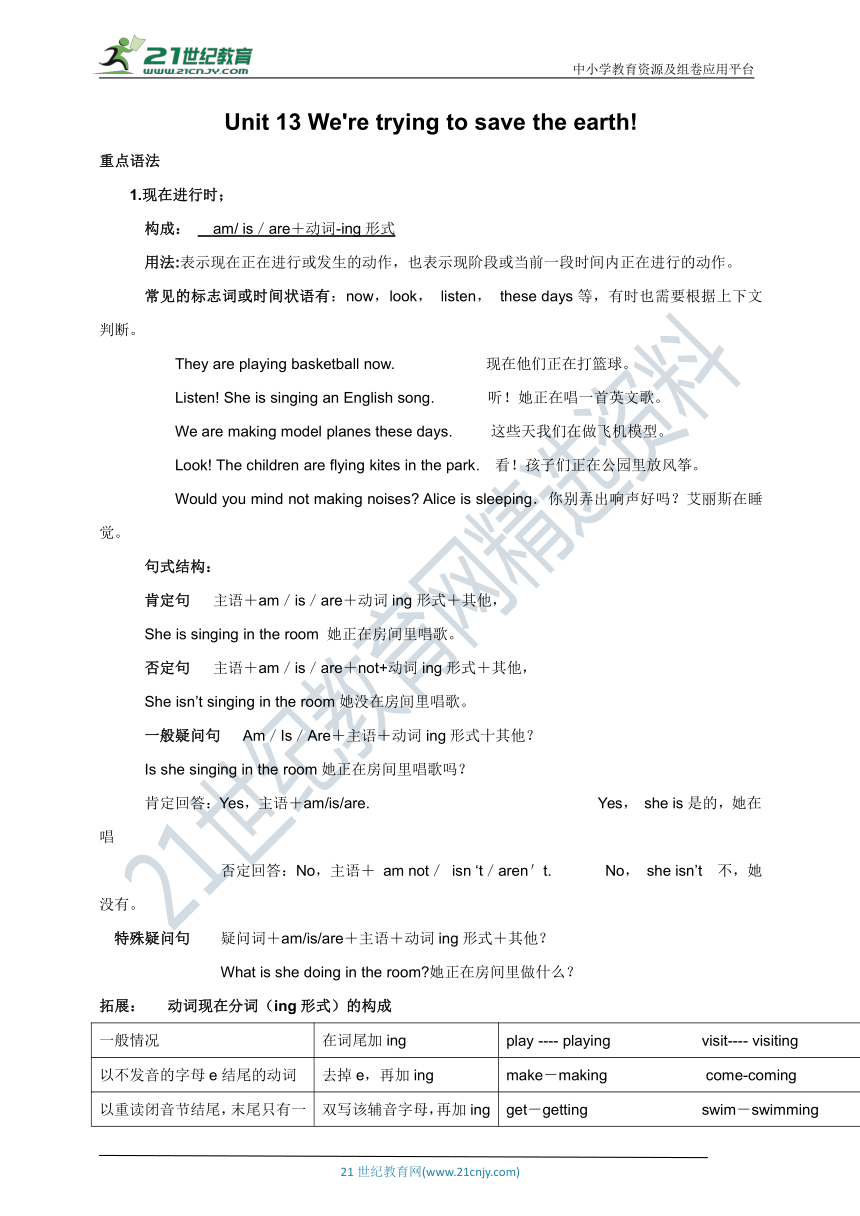
中小学教育资源及组卷应用平台 Unit 13 We're trying to save the earth! 重点语法 1.现在进行时; 构成: am/ is/are+动词-ing形式 用法:表示现在正在进行或发生的动作,也表示现阶段或当前一段时间内正在进行的动作。 常见的标志词或时间状语有:now,look, listen, these days等,有时也需要根据上下文判断。 They are playing basketball now. 现在他们正在打篮球。 Listen! She is singing an English song. 听!她正在唱一首英文歌。 We are making model planes these days. 这些天我们在做飞机模型。 Look! The children are flying kites in the park. 看!孩子们正在公园里放风筝。 Would you mind not making noises? Alice is sleeping.你别弄出响声好吗?艾丽斯在睡觉。 句式结构: 肯定句 主语+am/is/are+动词ing形式+其他, She is singing in the room 她正在房间里唱歌。 否定句 主语+am/is/are+not+动词ing形式+其他, She isn’t singing in the room她没在房间里唱歌。 一般疑问句 Am/Is/Are+主语+动词ing形式十其他? Is she singing in the room她正在房间里唱歌吗? 肯定回答:Yes,主语+am/is/are. Yes, she is是的,她在唱 否定回答:No,主语+ am not/ isn ‘t/aren't. No, she isn’t 不,她没有。 特殊疑问句 疑问词+am/is/are+主语+动词ing形式+其他? What is she doing in the room?她正在房间里做什么? 拓展: 动词现在分词(ing形式)的构成 一般情况 在词尾加ing play -- playing visit-- visiting 以不发音的字母e结尾的动词 去掉e,再加ing make-making come-coming 以重读闭音节结尾,末尾只有一个辅音字母的动词 双写该辅音字母,再加ing get-getting swim-swimming 以ie结尾的动词 将ie变为y,再加ing tie-tying lie-lying die--dying 助记:一般情况这样变,词尾直加-ing;词尾若是哑音e,去e再加-ing;一辅重读闭音节,辅音字母要双写, 词尾如果是ie,变y再加(ing)也不迟。 口诀:一般直接加ing,见e去e加ing,遇上辅元辅,双写尾字母,再加ing.遇上ie改成y,再加ing. 注意:(1)一些表示位置移动的动词,如go,come, leave等常用现在进行时表示将来。 She's leaving for London tomorrow. 明天她将前往伦敦 下列动词通常不用于现在进行时: 1)表示记忆、理解或决定的动词,如remember, forget, understand, believe, decide等 2)表示感觉、情感、心理活动的动词,如hear, see, smell, taste, notice, seem, like, hate, love, want, wish, hope等。 3)表示所有或占有的动词,如have,own,belong等 2. used to的用法; 1)“used to+动词原形”表示过去存在某种状态或者过去经常性、习惯性的动作,暗含着这种状态或动作目前已不存在的意思。 2)“used to be+形容词/名词(短语)” 表示过去存在某种状态。 used to的句式结构: 肯定句 主语+ used to+动词原形+其他 He used to play basketball after school他过去常常放学后打篮球。 否定句 主语+didn’t use to+动词原形+其他 或 主语+ usedn’ t to+动词原形+其他 She didn’t use to have long hair= She usedn’ t to have long hair.她以前没留长发。 一般疑问句 Did+主语+ use to+动词原形+其他? 或 Used+主语+to+动词原形十+其他? Did you use to play the piano?=Used you to play the piano?你过去经常弹钢琴吗? 拓展: 1)be/get used to doing sth.意为“习惯于做某事” My grandfather is used to going for a walk after dinner.我爷爷习惯于吃饭后去散步。 be used to do sth.意为“被用来做某事”。 Wood can be used to make paper.木头能用 ... ...
~~ 您好,已阅读到文档的结尾了 ~~